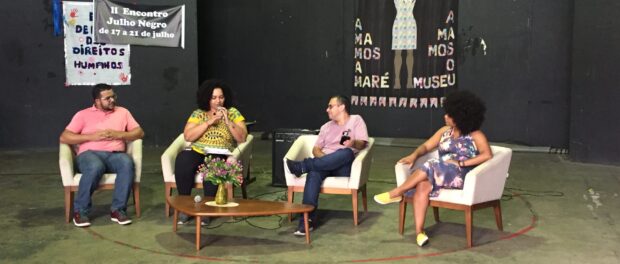
Last Friday, July 20, on the final day of Black July week, the Maré Museum held a roundtable conversation on mass incarceration and the criminalization of favela residents in Brazil. Representatives from the Campaign for the Freedom of Rafael Braga, Family Members of the Incarcerated (AFAP), and Eu Sou Eu, Reflexo de Uma Vida na Prisão were present and served as panelists, sharing their experiences with activism around prison justice.
In 2015 there were 622,000 people incarcerated in Brazil, 28,000 of whom were in Rio. Today, Rio’s incarcerated population is at 51,000 and growing. 62% of those incarcerated in Brazil are black. In Ceará, while 69% of the state’s population is black, 98% of incarcerated women are black. 41% are held in jail without a sentence, and 37% end up absolved. Most incarcerated Brazilians in jail are there for crimes against property and do not pose a serious threat. These numbers help to situate how institutionalized racism manifests.
The discussion focused on the connection between mass incarceration and systems of domination, namely white supremacy, patriarchy, capitalism, and colonial legacies. In particular, Brazil’s prisons today were described as a continuation of the sociedade escravocrata, or slave-holding society logic that has never been dismantled in the cultural ethos, where black, indigenous, and low-income populations are denied full rights and freedoms. “Brazil has always been a prison territory and its society was never developed to include the black population,” said Clarens Therry, Haitian immigrant and leader of the Haitian Immigrant Social Union (USIH). Historically, the first prison was built to receive “disobedient” enslaved Africans.
Speakers discussed the goal of massively reducing the prison population based on a critical understanding of the incarceration system as rooted in slavery and racism. The State Front for Extrication was launched in Rio on January 26 in response to inhumane prison conditions (in 2016, at least 256 incarcerated people died under state custody in Rio de Janeiro), the growing privatization of prisons, and injustices caused by the judicial system. Prisons in Brazil typically pack 50-70 people into a space meant for 30. It is common for people to sleep on the bare floor, and the spread of bacterial diseases is an urgent issue.
Along with having to live through traumatizing prison conditions, government provides no support systems to return inmates to society and support them in finding employment. Samuel Lorenzo, a former inmate and now active member of Eu Sou Eu, an organization promoting to improve rights and conditions of prisoners, explained: “One of the major failures of the state is that reintegration of ex-detained people into society is not prioritized.” In fact, as multiple people argued during the discussion, economic interests and cheap labor are prioritized over the right to rehabilitation, thus creating a system of long-term exclusion and injustice for those who have been previously incarcerated.
Daisy, representative of the Campaign for the Freedom of Rafael Braga, described the young man’s trial and struggle for freedom. The arbitrary accusations for the imprisonment of Braga attracted global publicity and the campaign for his liberation has gained massive public support. She described how being young and black in Brazil already applies as a valid profile to be incarcerated: “The imprisonment of Rafael symbolizes the criminalization of poor blacks.” In Braga’s case, the terms and proof for his sentence are completely arbitrary. While neglecting other forms of evidence, police reports served as sufficient proof for his arrest. During his trial, the judge labeled Braga as having “a personality with a tendency for crime” despite him being arrested for carrying a bottle of a commonly used cleaning product. Daisy explained that mass incarceration of black youth has a social impact beyond the lives of the convicted: “If you incarcerate one black man, you incarcerate a whole family. The family and wives of those men also suffer this violence.”
The discussion was then opened to the public. Clarens Therry and Deborah Maria da Silva, founder and organizer of Mães de Maio took the mic and delivered powerful calls to action. The need to learn from past resistance strategies, such as the Haitian revolution and the almost 100 year existence of Quilombo dos Palmares was brought up. In addition, people spoke about the need to criminalize slavery. Black and poor people are being criminalized in Brazil while the country’s long history of slavery and its continuation through the militarization of the state is yet to be criminalized. The discussion ended with a strong call to action and a need to centralize the experience and knowledge of those most impacted by state violence. “We already know that nothing will be accomplished from a top-down approach, so it needs to come from the bottom-up,” said Therry. Furthermore, “we need to bring the revolution to the streets”.
The series of events, protests and conversations that made up the second Black July week made abundantly clear how violence and crime in Brazil are continuously racialized and used as tools for oppressing low-income people of color, with deep roots in times of slavery. The spaces, all over Rio’s metropolitan region, that hosted the diverse events all week, from a street protest in the city center marking the Candelária massacre to a panel discussion on data and statistics in a church in the Baixada Fluminense, are manifestations of a growing movement against the crimes and injustices of a non-functioning state apparatus. The powerful and extensive program brought together dozens of community organizations, activist groups and individuals from local communities and around the world. Their evocative presence, quotes and stories propel the global movement for equality and dignity forward.



